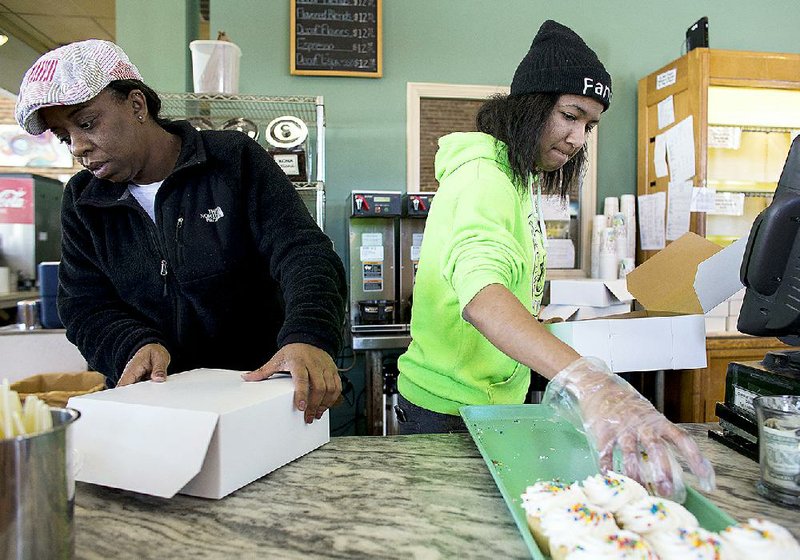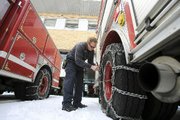CONWAY -- The snowstorm that hit much of Arkansas forced the cancellation of basketball games and plane flights. Many schools and government offices closed. But Starbucks, fast-food restaurants and, more importantly, hospitals were among those open for business Thursday.
Like other hospitals, Conway Regional Medical Center implements special procedures to be sure that essential employees get to work when bad weather causes hazardous driving conditions.
"You have a car accident. You want to be sure there's someone there" when you get to the hospital, said hospital spokesman Lori Ross Scroggin.
Twenty of the hospital's roughly 1,300 employees -- a mix of clinical and nonclinical staff -- spent Wednesday night in the medical center, and the hospital gave rides to about 10 workers Thursday morning, Scroggin said.
"We go on an inclement-weather status in a situation like this, which means if you are in an area where patient care is depending upon your job, there are certain steps you must take to get in. We can offer you a ride. ... If you're one of those critical people and you deny the ride, there are repercussions," she said.
Getting that morning latte or espresso may not be critical to everyone, but it's important enough to some that the Starbucks on Oak Street was open for business by 7:15 a.m. Thursday.
By late morning, business hadn't been nearly as good as usual, but several groups were each dispatching one person to drive to pick up orders.
"They'll get big orders because they're taking it to work," an employee said.
Cheeseburgers and fries may not be essential, either, but by late morning, the Burger King on Skyline Drive in Conway had served about 15 customers who braved the snow and ice, said store manager Steve Wooten.
Back at Conway Regional, the safety department coordinates transportation needs after personnel determine how many employees must be present and which ones are essential.
"I'm the taxi service that goes and gets folks who need a ride," said Eric Kindsfater, director of safety, security and communications at Conway Regional.
He uses a vehicle with four-wheel drive for the service that kept him away from home until about 10:45 p.m. Wednesday and had him back on the road about 4:45 a.m. Thursday.
Some rides take him out of town. He had to drive to Wooster, a rural community in Faulkner County, on Thursday morning, for instance.
"Today, I'm almost at 100 miles" of driving, Kindsfater said. And he still had to get the same workers back to their homes later Thursday.
There are people who can't stay at the hospital or a hotel overnight, he said.
"They've got kids; they've got pets to feed. ... They've got to be in their homes," he said. "There's such a range, it's never a requirement that anyone stays" overnight.
"We try to get folks in before the event. We do everything we can to pre-plan, but that doesn't always work out," he said.
"If we have room at the inn, so to speak, we will put [employees] up" at the hospital, Kindsfater said. If not, the employees can stay at local hotels at "deeply discounted rates," but at their own expense, he said.
Essential staff includes far more than doctors and nurses. Among them are employees who make sure the hospital's heating system works properly, those who clean rooms after patients are released, the workers who make sure the parking lots are safe to use, those who prepare the meals for patients and staff, and more.
Each department decides which positions are essential. But the hospital also tries to think of the workers' personal needs.
The department leader "can say, 'Well, OK, you live in Searcy. You go ahead and stay home. ... We're going to get someone who lives two blocks away. We're going to swap shifts this week,'" he said.
Those employees who are determined essential and offered rides but who don't show up anyway are not allowed to take paid vacation time. "If you don't work [in that situation], you don't get paid," he said.
Nonessential workers, though, are free to take paid vacation time if they can't get to work, he said.
Christina Munoz Madsen, an associate vice president at the University of Central Arkansas, was enjoying the "snow day" at her Conway home Thursday.
But when she worked as a reporter and news anchor at KATV, Channel 7, in Little Rock for 11 years, she often had to tackle icy roads to get to the TV station.
The station, at its expense, offered to put her up in a hotel room, she said. "Sometimes I would ask a photographer for a ride."
She and other staff members would "try to get rides with each other" or get a hotel room before a storm, she said.
The trips to work didn't always go smoothly.
"I remember calling my husband because I was stuck and spinning" once, she said. "But I was able to navigate" out of the ice. "I do know other anchors and reporters who have had wrecks" and fender-benders trying to do their job.
"I certainly enjoy the snow days now," said Madsen, who was warming up with hot chocolate after taking her two little girls outside to go sledding and make snowmen.
State Desk on 03/06/2015


